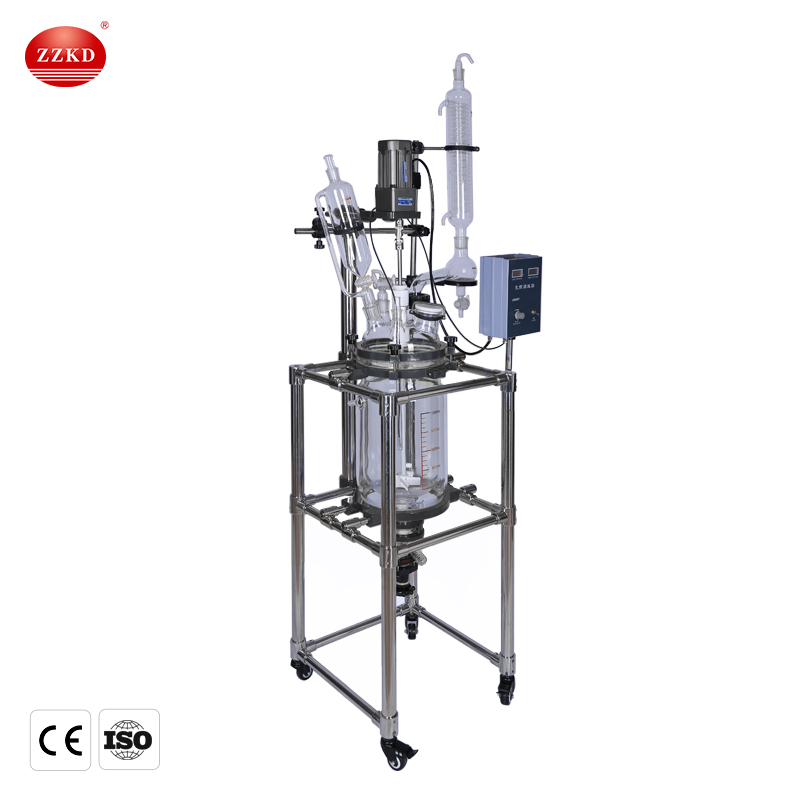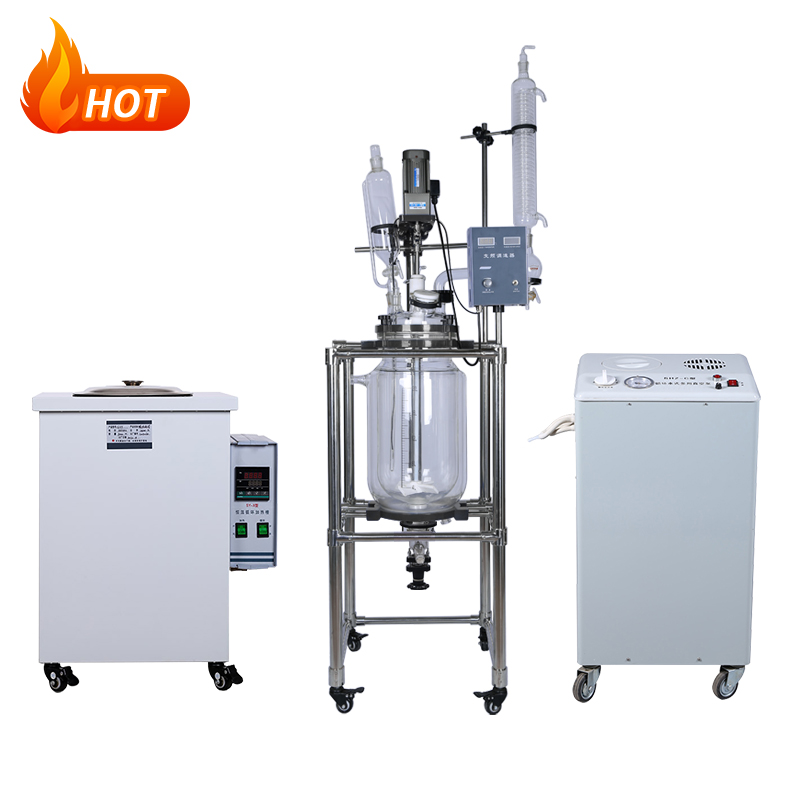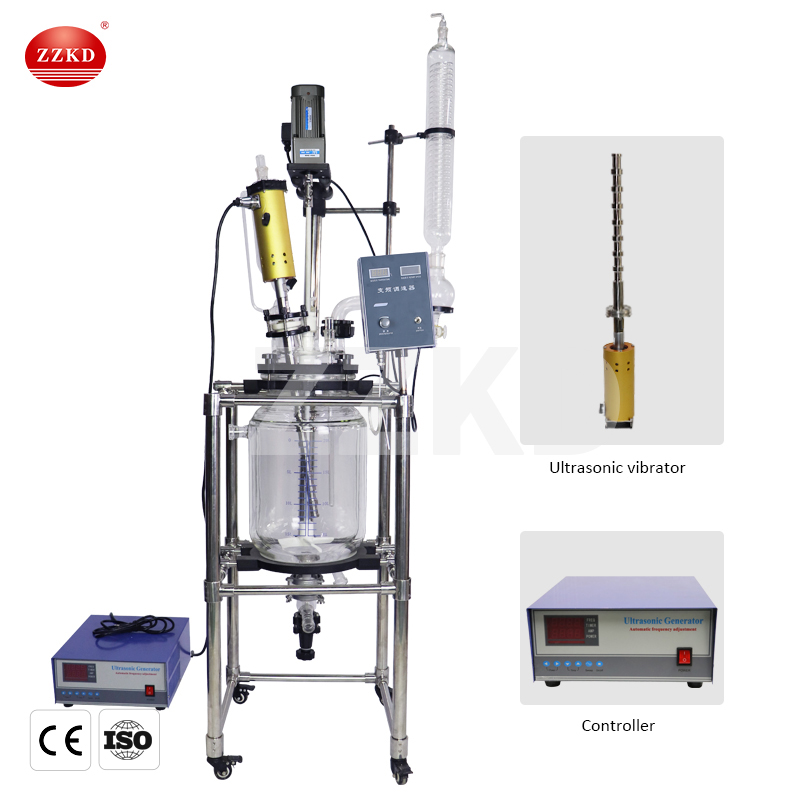10L Jacketed Glass Reactors Vessel
ZZKD Machinery is a professional glass reactor manufacturer. With more than ten years of production and R&D experience, strong strength and excellent technology, we guarantee to provide you with instruments and equipment with excellent quality, good performance, affordable price and excellent service.The 100l glass reactor is one of the company's flagship products. We are naturally very familiar with the use and price of the glass reactor.Glass reactors can be divided into single-layer, double-layer and triple-layer glass reactors. Reactors with different process technologies have different uses, different specifications and models, and different prices.But for users who are new to and using glass reactors, they may ask, what is the use of glass reactors? Is it expensive? So, today we will take the 10L glass reactor as an example to introduce the product information of the glass reactor.

The 10L glass reactor has a capacity of 10L. It is a small glass reactor and can be divided into two categories. The first type is a double-layer glass reactor and the second is a single-layer glass reactor.
The inner container of the 10l jacketed glass reactors vessel can be used to place the reaction materials, and at the same time, it can be vacuumized and stirred at a speed.Glass reactors are used for experiments, pilot tests and production in chemistry, fine chemicals, and biopharmaceutical new material synthesis.The product can be combined with circulating water type multi-purpose vacuum pump, diaphragm vacuum pump, low temperature circulating vacuum pump, circulating cooling device, constant temperature circulating device, low temperature refrigerating circulating pump, closed cooling heating circulating device, etc. to form a system device.
10L single-layer glass reactor is a kind of experimental equipment integrating vacuum, distillation, reflux, stirring, constant temperature water bath or oil bath. This multifunctional vacuum constant temperature single-layer glass reactor can carry out various biochemical reactions under constant temperatures. And synthetic reactions. The single-layer glass reactor is a completely closed system altogether. A circulating water vacuum pump can be used to generate negative pressure and inhale various liquids and gases. It can also be refluxed or distilled under various temperature conditions. A cooling coil has been added and a low temperature refrigeration circulation pump is configured for low temperature operation.

10L glass reactor product features
1. The motor of the reactor adopts DC variable frequency motor, which has large torque, no heat, no sparks, high efficiency and low noise in continuous operation. The digital display shows that the speed is the real speed instead of the simulated speed.
2. The material of the kettle body is GG17 high borosilicate glass material, which has excellent physical and chemical properties. It is resistant to high temperature difference of 80 degrees and can be used in large temperature areas from high temperature (300 ° C) to low temperature (-80 ° C).
3. It can work under normal pressure and vacuum conditions, and the vacuum degree in static state can reach below 0.095MPa.
4. The kettle body is fixed with tray-type bakelite gasket, which has good stability and is resistant to acid and alkali corrosion.
5. Anti-corrosion discharge valve with no dead space design.
10l jacketed glass reactors vessel operation steps
1. After vacuuming and turning on the vacuum pump, it is found that the vacuum cannot be applied. You should check whether the bottle openings are well sealed, whether the vacuum pump itself is leaking, whether the sealing ring at the shaft is in good condition, and a vacuum switch connected in series with an external tube can improve recovery. and evaporation rate. Feeding uses the vacuum negative pressure of the system, the liquid material can be sucked into the rotating bottle with a hose at the feeding port, the liquid material should not exceed half of the rotating bottle. Rotary evaporator can continuously feed material, please pay attention to 1. Turn off the vacuum when feeding. 2. Stop adding. 3. After the evaporation has stopped, slowly open the faucet on the tube to prevent backflow.
2. Heating. The rotary evaporator is equipped with a specially designed water bath. It must be powered on after adding water. The temperature control scale is 0-99 °C for reference.Due to the existence of thermal inertia, the actual water temperature is about 2 degrees higher than the set temperature. The set value can be corrected during use, and the power plug can be pulled out after use.
3. Rotate, turn on the switch of the electric control box, and adjust the knob to the best evaporation speed.Be careful to avoid the vibration of the water bath.
4. Turn on, turn on the cooling water.
5. Recover the solvent, turn off the vacuum pump, open the feeding switch to release the air, and take out the solvent in the collection bottle.

10l jacketed glass reactors vessel and its supporting facilities
When using glass reactors, the functionality of individual glass reactors is limited. A complete set of experiments is usually done together using other equipment. Commonly used supporting equipment is a low temperature coolant circulating pump and a circulating water vacuum pump. Although the circulating water vacuum pump has some shortcomings, it is still a common vacuum pump equipment. Its main function is to provide a vacuum source, and it can also provide circulating cooling water for the glass reactor. There are two types of circulating water vacuum pumps: desktop and vertical. The benchtop is suitable for small-capacity glass reactors. The volume of the desktop small circulating water vacuum pump is 15L, and the 10L glass reactor can be equipped with a desktop small circulating water vacuum pump.
When purchasing instruments and equipment, the price of the equipment is a topic that every user is more concerned about. So, what is the price of the 10l jacketed glass reactors vessel? In the market, because of different manufacturers, the price will also be different, not to mention that there are so many models, different models have different prices, different configurations, and different prices. Generally, the prices of glass reactors on the market range from small to large, ranging from more than 2,000 to more than 10,000 yuan. As for the specific price, we need to determine the equipment model, configuration, performance, etc., and then we can quote the accurate price.
Welcome to contact us for the latest product information: [email protected]


